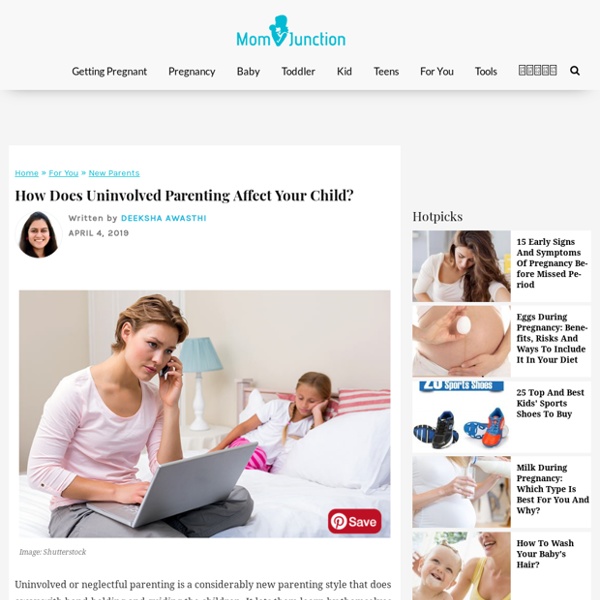Characteristics and Effects of Uninvolved Parenting
Uninvolved parenting, sometimes referred to as neglectful parenting, is a style characterized by a lack of responsiveness to a child's needs. Uninvolved parents make few to no demands of their children and they are often indifferent, dismissive, or even completely neglectful. The Major Parenting Styles During the 1960s, psychologist Diana Baumrind described three different parenting styles based on her research with preschool-age children: authoritarian, authoritative, and permissive parenting. In later years, researchers added a fourth style known as uninvolved parenting.
Characteristics and Effects of Uninvolved Parenting
Uninvolved parenting, sometimes referred to as neglectful parenting, is a style characterized by a lack of responsiveness to a child's needs. Uninvolved parents make few to no demands of their children and they are often indifferent, dismissive, or even completely neglectful. The Major Parenting Styles During the 1960s, psychologist Diana Baumrind described three different parenting styles based on her research with preschool-age children: authoritarian, authoritative, and permissive parenting.
The Long-Term Impact of Neglectful Parents
Source: JPagetRFPhotos/Shutterstock If you were emotionally or physically neglected as a child, it can be a difficult journey to healing. Neglect can be a hard thing to put your finger on, especially emotional neglect. Neglected children often don’t realize they are being neglected at the time, and can internalize the pain and loneliness and think it is their fault. They are often told they are “too sensitive” or “selfish” if they try to get their needs met.
The Risks Of an Uninvolved Parenting Style
Updated July 13, 2019 Do you know what type of parenting style you have, or what type your parents had? Knowing what parenting style(s) a child was raised with can tell you a lot about their behavior as they age, and even when they start raising their kids.
Authoritarian parenting: What happens to the kids?
Photo by CEphoto, Uwe Aranas © 2010-2017 Gwen Dewar, Ph.D., all rights reserved The authoritarian parenting style is about being strict and stern. It insists on unquestioning obedience, and enforces good behavior through threats, shaming, and other punishments.
What Is Permissive Parenting?
Permissive parenting is a type of parenting style characterized by low demands with high responsiveness. Permissive parents tend to be very loving, yet provide few guidelines and rules. These parents do not expect mature behavior from their children and often seem more like a friend than a parental figure. These parents tend to be the polar opposite of the so-called "helicopter parents." Instead of hovering over their children's every move, permissive parents are incredibly lax and rarely make or enforce any type of rules or structure. Their motto is often simply that "kids will be kids."
Permissive Parenting: Its Characteristics And Effect On Children
Image: Shutterstock Daniel’s parents were highly affectionate to him. He was allowed to sleep late and wake up whenever he wanted.
What Is Authoritative Parenting?
Authoritative parenting is characterized by reasonable demands and high responsiveness. While authoritative parents might have high expectations for their children, they also give their kids the resources and support they need to succeed. Parents who exhibit this style listen to their kids and provide love and warmth in addition to limits and fair discipline. This approach to parenting avoids punishment and threats and instead relies on strategies such as positive reinforcement.
Quiz 2
Instructions: This quiz is designed to help you better understand your parenting style. For each item, indicate how much you agree or disagree with the statement. This takes most people about 4 minutes to complete. Take your time and answer truthfully for the most accurate results.



